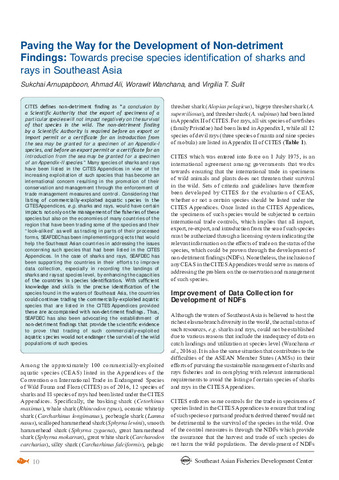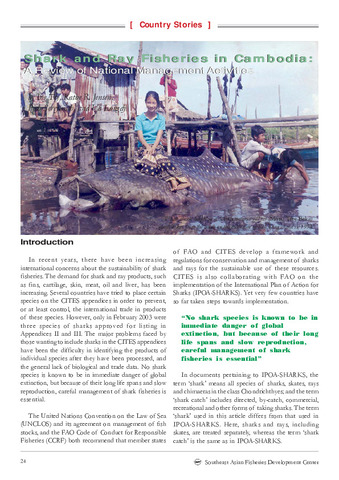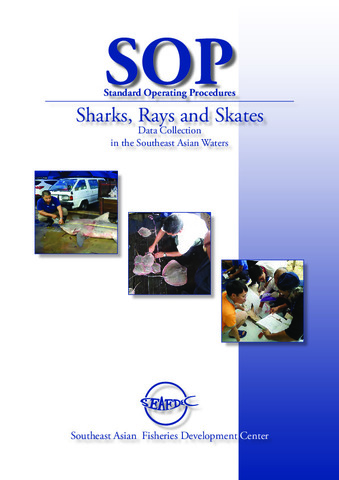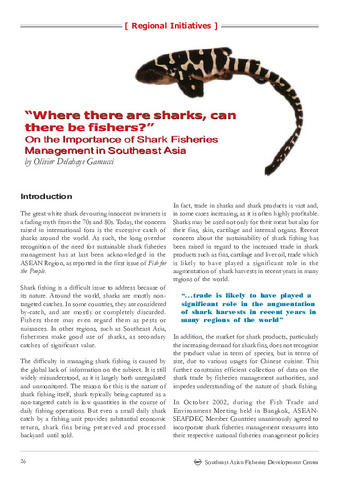| dc.contributor.author | Arnupapboon, Sukchai | |
| dc.contributor.author | Ali, Ahmad | |
| dc.contributor.author | Wanchana, Worawit | |
| dc.contributor.author | Sulit, Virgilia T. | |
| dc.date.accessioned | 2019-10-03T05:56:52Z | |
| dc.date.available | 2019-10-03T05:56:52Z | |
| dc.date.issued | 2019 | |
| dc.identifier.citation | Arnupapboon, S., Ali, A., Wanchana, W., & Sulit, V. T. (2019). Paving the way for the development of non-detriment findings: Towards precise species identification of sharks and rays in Southeast Asia. Fish for the People, 17(2), 10-15. | en |
| dc.identifier.uri | http://hdl.handle.net/20.500.12066/5520 | |
| dc.description.abstract | CITES defines non-detriment finding as “a conclusion by a Scientific Authority that the export of specimens of a particular species will not impact negatively on the survival of that species in the wild. The non-detriment finding by a Scientific Authority is required before an export or import permit or a certificate for an introduction from the sea may be granted for a specimen of an Appendix-I species, and before an export permit or a certificate for an introduction from the sea may be granted for a specimen of an Appendix-II species.” Many species of sharks and rays have been listed in the CITES Appendices in view of the increasing exploitation of such species that has become an international concern resulting in the promotion of their conservation and management through the enforcement of trade management measures and control. Considering that listing of commercially-exploited aquatic species in the CITES Appendices, e.g. sharks and rays, would have certain impacts not only on the management of the fisheries of these species but also on the economies of many countries of the region that have been trading some of the species and their “look-alikes” as well as trading in parts of their processed forms, SEAFDEC has been implementing projects that would help the Southeast Asian countries in addressing the issues concerning such species that had been listed in the CITES Appendices. In the case of sharks and rays, SEAFDEC has been supporting the countries in their efforts to improve data collection, especially in recording the landings of sharks and rays at species level, by enhancing the capacities of the countries in species identification. With sufficient knowledge and skills in the precise identification of the species found in the waters of Southeast Asia, the countries could continue trading the commercially-exploited aquatic species that are listed in the CITES Appendices provided these are accompanied with non-detriment findings. Thus, SEAFDEC has also been advocating the establishment of non-detriment findings that provide the scientific evidence to prove that trading of such commercially-exploited aquatic species would not endanger the survival of the wild populations of such species. | en |
| dc.language.iso | en | en |
| dc.publisher | Secretariat, Southeast Asian Fisheries Development Center | en |
| dc.subject | Sharks | en |
| dc.subject | Rays (fish) | en |
| dc.subject | South East Asia | en |
| dc.title | Paving the way for the development of non-detriment findings: Towards precise species identification of sharks and rays in Southeast Asia | en |
| dc.type | magazineArticle | en |
| dc.citation.volume | 17 | |
| dc.citation.issue | 2 | |
| dc.citation.spage | 10 | |
| dc.citation.epage | 15 | |
| dc.citation.journalTitle | Fish for the People | en |
| dc.subject.asfa | shark fisheries | en |
| dc.subject.asfa | identification | en |
| dc.subject.asfa | resource conservation | en |
| dc.subject.asfa | Protected resources | en |
| dc.subject.asfa | rare resources | en |
| dc.subject.asfa | resource management | en |
| dc.subject.asfa | trade | en |
| dc.subject.asfa | commercial species | en |
| dc.subject.asfa | Data collections | en |
| dc.subject.asfa | surveys | en |
| dc.subject.asfa | fishery management | en |




